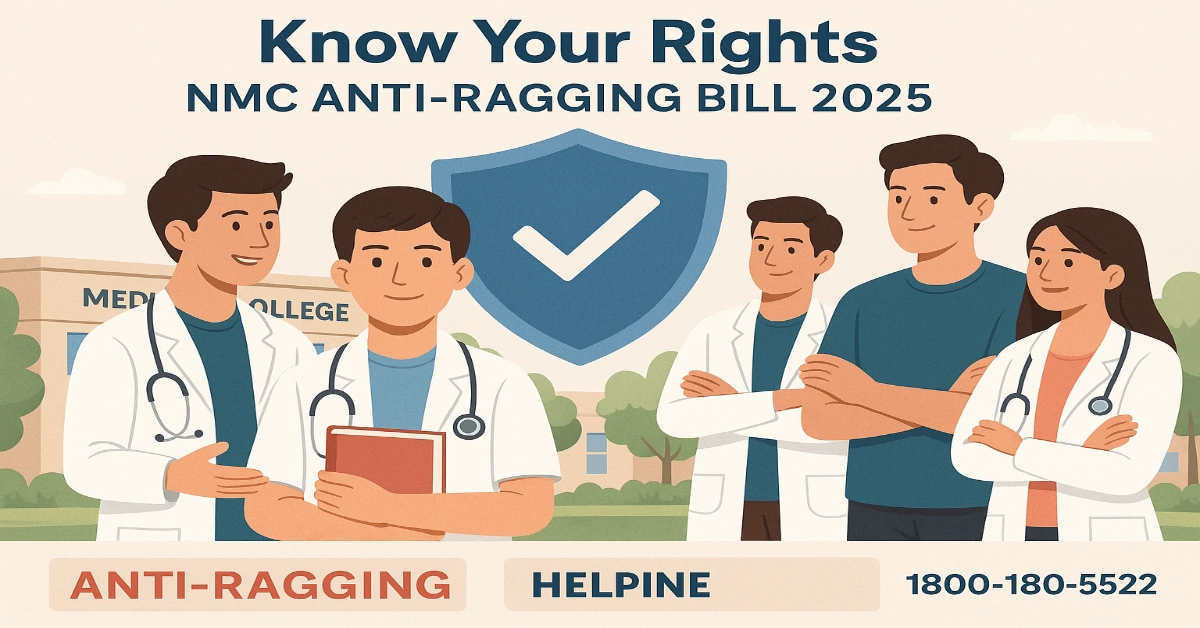NMC Anti-Ragging Bill 2025: For first-year MBBS students, the transition into medical college life can be challenging. Unfortunately, some students face the added distress of ragging, a practice that undermines the dignity and well-being of individuals. Recognising this, the National Medical Commission (NMC) has taken significant steps to combat ragging and ensure a safe environment for all medical students.
What is Ragging: Definition
The National Medical Commission (NMC) has taken difinition og ragging from According to NMC Anti-Ragging Bill the Supreme Court of India’s difinition given in Vishwa Jagriti case (1999).
In the Vishwa Jagriti case (1999), the Supreme Court of India (SC) defined ragging as:
“Any disorderly conduct, whether by words spoken or written, or by acts, that teases, treats rudely, or handles another student in a harsh manner; indulges in rowdy or undisciplined behavior causing or likely to cause annoyance, hardship, or psychological harm; raises fear or apprehension in a fresher or junior student; or compels a student to perform acts that they would not ordinarily do, resulting in shame, embarrassment, or adverse impact on their physical or mental well-being.” (Raghavan Committee Report, 2007, para. 3.19)
The Committee of Consultants to the Raghavan Committee (2007) described ragging as “neither a form of familiarisation nor a welcome ritual for freshers, but rather a manifestation of psychopathic behaviour and deviant personalities. Moreover, it reinforces entrenched power hierarchies present in broader society.”
Read Also: NMC Medical College Faculty Rule 2025: Know Who Will Teach You MBBS!
NMC Anti-Ragging Bill 2025: Key Provisions
The NMC Anti-Ragging Bill aims to eradicate ragging from medical institutions across India. Building upon the Supreme Court’s directives and the University Grants Commission’s (UGC) guidelines, the NMC has instituted comprehensive measures to prevent and address ragging incidents.
Key provisions include:
- Mandatory Anti-Ragging Committees: Every medical college is required to establish an Anti-Ragging Committee responsible for overseeing anti-ragging initiatives and addressing complaints.
- Awareness Campaigns: Institutions must conduct regular awareness programs to educate students about the detrimental effects of ragging and the importance of maintaining a respectful environment.
- Strict Punishments: The Bill outlines stringent penalties for those found guilty of ragging, ranging from suspension to expulsion, depending on the severity of the offence.
- Support Systems: Establishment of counselling services and support systems for victims to help them cope with the psychological impact of ragging.
Read Also: NMC Fee Guidelines: 50% Private Medical Seats at Govt College Fees
NMC Anti-Ragging Bill 2025 PDF
Commission (Prevention and Prohibition of Ragging in Medical Colleges and Institutions) Regulations, 2021Download
NMC Anti-Ragging Bill 2025: Rights of 1st Year MBBS Students
As a first-year MBBS student, it’s crucial to be aware of your rights under the NMC Anti-Ragging Bill:
- Right to a Safe Environment: You are entitled to pursue your studies in an environment free from any form of harassment or intimidation.
- Right to Report: You have the right to report any incident of ragging without fear of retaliation. Institutions are mandated to maintain confidentiality and protect the identity of complainants.
- Right to Support: Access to counselling services and support mechanisms is available to help you navigate any distress caused by ragging incidents.
- Right to Justice: If you are a victim of ragging, you have the right to seek justice through institutional mechanisms or legal avenues.
- Right to Awareness: Institutions are required to provide information about anti-ragging measures and your rights at the time of admission.
Responsibilities of Medical Colleges
Medical colleges play a pivotal role in implementing the provisions of the NMC Anti-Ragging Bill:
- Establish Anti-Ragging Committees: Colleges must set up committees to monitor and address ragging-related issues.
- Conduct Awareness Programs: Regular sessions should be held to educate students and staff about the harmful effects of ragging.
- Implement Preventive Measures: Colleges should take proactive steps to prevent ragging, such as orientation programs and peer mentoring.
- Address Complaints Promptly: Any complaints of ragging must be addressed swiftly and impartially, ensuring justice for the victims.
Read Also: NMC Approves 123700 MBBS Seats & 808 Medical Colleges: India Beats the World in Medical Education
How to Report Ragging
If you or someone you know is subjected to ragging, it’s essential to report the incident promptly:
- National Anti-Ragging Helpline: Call 1800-180-5522 (24×7 Toll-Free) or email [email protected].
- Institutional Anti-Ragging Committee: Contact your college’s Anti-Ragging Committee for immediate assistance.
- Online Portal: Visit www.antiragging.in to lodge complaints and access resources.
Case Study: Action Against Ragging at MKCG Medical College
In a recent incident at MKCG Medical College and Hospital in Berhampur, a second-year MBBS student filed a complaint against six senior students for ragging.
The complaint was submitted to the National Anti-Ragging Helpline and subsequently forwarded to the medical college by the NMC. The college initiated an investigation, and an Anti-Ragging Committee meeting was scheduled to address the issue.
This case underscores the importance of the NMC’s proactive approach in addressing ragging incidents and ensuring accountability.
Read Also: Medical College Expansion in India: CSS Phase 1-2-3 Explained
The NMC Anti-Ragging Bill serves as a robust framework to protect first-year MBBS students from the menace of ragging. By understanding your rights and the mechanisms in place, you can contribute to fostering a respectful and conducive learning environment. Remember, you are not alone, support is available, and action will be taken to uphold your dignity and safety.

